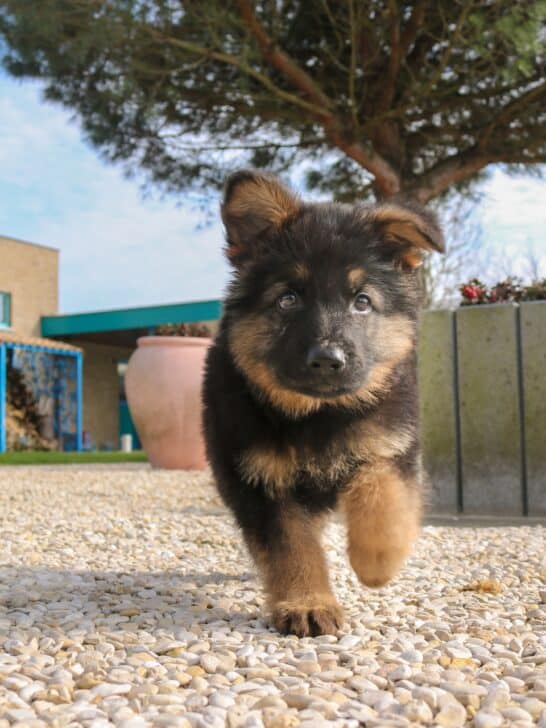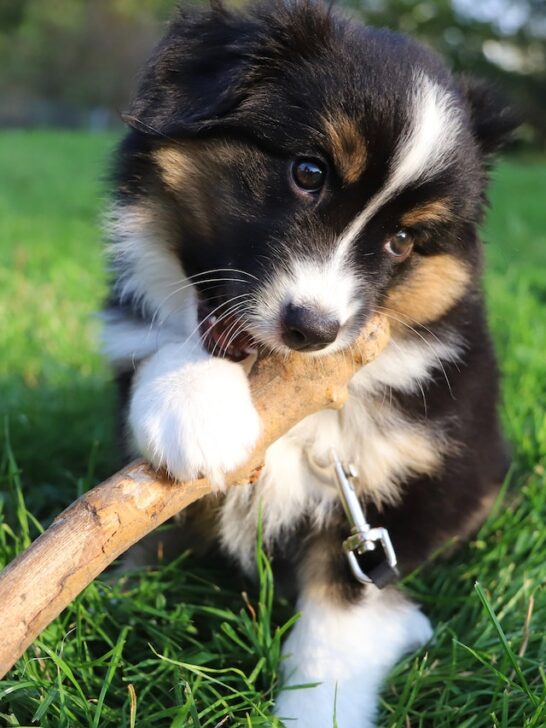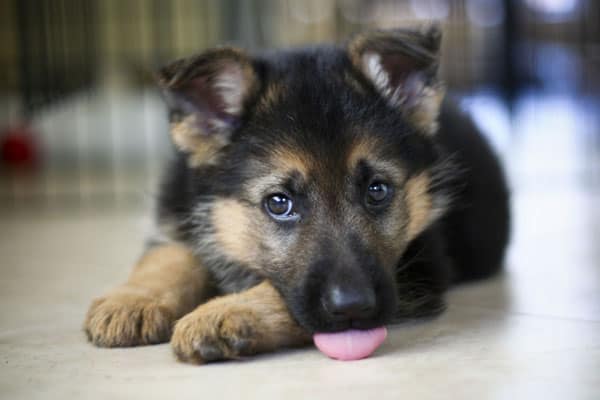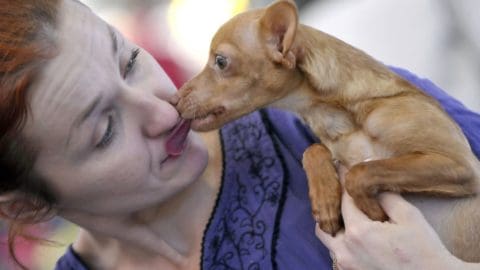Are German Shepherds Safe with Babies? What You Should Know
How Do Shepherds and Children Relate?
According to Canna-Pet, German Shepherds are the second-most popular breed in America, with good reason. They are devoted to and protective of their family members.
However, how does this translate to how German Shepherds relate to children, particularly babies? Does their protective nature make them an asset or liability for babies?
One important thing to bear in mind regarding German Shepherds is that they are a product of their environment. Owners who socialize their dogs properly will be likely to have well-adjusted dogs, but there are aspects of the breed’s personality to keep in mind.
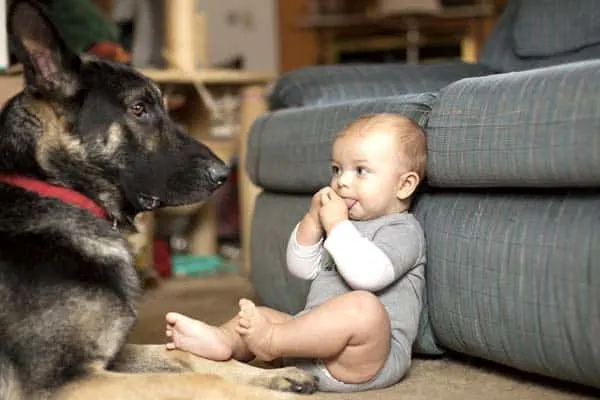
German Shepherds Have Unique Needs
One thing that many are unaware of is that dogs the size of German Shepherds take longer to mature than many other breeds. They will usually obtain full maturity around three years of age.
Another unique aspect to keep in mind about German Shepherds is that they play rough as young dogs. They are likely not to know their strength, increasing the risk of injury to babies.
These Dogs Are Highly Trainable
One of the best features that german shepherds possesses is a high trainability level. Because they are easy to train, their owners can teach them to interact with children safely.
Proper supervision and socialization are necessary. Supervising your baby’s interactions with pets is always a necessity.
Always keep your essential place as your dog’s “pack leader” in mind. The more your dog recognizes your position as a leader, the more he or she will want to please you.
How Do German Shepherds Socialize?
As flock guardian dogs, these shepherds have a firm pack mentality that makes them responsive to training and eager to please. One of the best ways to socialize a German Shepherd to a baby is to help them accept the infant as a fellow pack member.
One of this breed’s strongest traits is its strong protective instinct. A german shepherd’s strength and sturdy build, however, make supervision around babies necessary. Otherwise, they might try to play with an infant the same way they might play with another dog.
They Are a Loyal Breed
One thing that stands out about German Shepherds is their loyalty to every person in their house. Once socialized around a baby, your dog will feel the urge to protect him or her.
Even though no dog should be left unattended with an infant, their urge to protect will make them more aware of threats to a child. German Shepherds are effective at protecting babies from threats that include aggressive animals and dangerous people.
How Does a New Baby Influence Things?
A new baby’s arrival is a joyous occasion, but, according to Shepped, new additions can present challenges. The dog will need to adjust to a whole new routine.
Dogs are creatures of habit, with schedules and boundaries that they become used to. However, your routine changes with a new infant and pets are conscious of these changes.
Most dogs will adapt to the new routine quickly enough. However, it’s essential to handle the introductions well; otherwise, he or she might develop jealousy issues.
Can Dogs Have Jealousy Issues?
Even the most even-tempered German Shepherd might develop jealousy issues. Aggression, overexcited behavior, and acting out are all possible with poorly handled introductions.
Other household members, including pets, and the German Shepherd’s temperament can all play a role in whether the dog becomes jealous. There are a few signs that a dog might be prone to jealous behavior.
A dog that acts out towards anyone who gets close to the owner is possibly suffering from jealousy. They are insecure, fearing losing attention or love, and might see a baby as a rival.
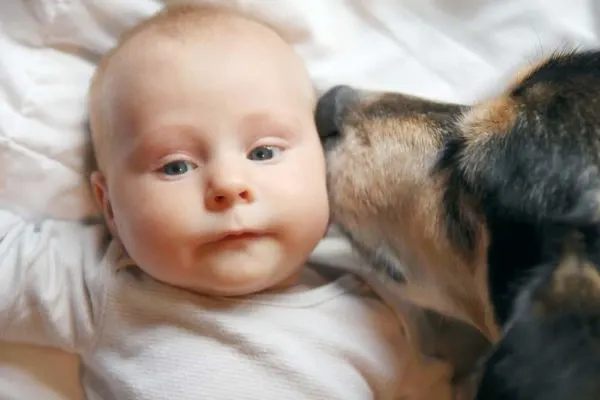
What Should You Do Before Baby’s Arrival?
Preventing jealousy issues before they arise is always better. Your dog will need to become accustomed to new routines, respect important boundaries you have set, and get used to what is likely a whole new attitude in your home.
Start keeping your anticipated schedule well in advance of your child’s arrival. Your dog will have a chance to get used to everything, without all of it impacting them at once. The dog will also be less likely to associate a change in routine with the baby.
Have clear boundaries about where your dog can go, especially the nursery. Allowing your dog to sniff around the room without the baby present is okay. You do, however, need to make sure he or she understands that they only enter when you’re with them.
To keep the family dog out of the nursery area, consider a sturdy baby gate or screen door. They are useful because your dog will still see or hear the baby, without being able to get into their space without your knowledge.
In addition to having a physical barrier, you will need to establish boundaries for the baby’s belongings. The dog toys shouldn’t resemble your baby’s toys, and the baby toys should be off-limits to the dog to prevent accidental bites.
Another important boundary is keeping your family dog off furniture in the nursery. When a dog is allowed to sit or lie on a piece of furniture, he or she sees it as its territory. A dog might react by biting or otherwise harming the baby if allowed on the bed.
Acclimating your German Shepherd to baby sounds can also help. Reward your dog with a play session or treat for a positive response to the new sounds. Even if the reaction is more in the form of curiosity, this will make a positive difference.
Dogs should always get rewards for calm and submissive behavior. Showing firm but gentle leadership helps show the dog what behavior is and isn’t okay.
Letting your dog smell a burp cloth, blanket, or other item belonging to the baby will help them get used to the new scent before homecoming. Allowing a positive, supervised interaction with others who have babies or small children get can be helpful.
If your dog seems to struggle with doing what you expect of them, consider seeking the help of a behavioral specialist. Their advice and support give you the tools to help overcome your dog’s more challenging behavior.
Does Your Dog’s Health Play a Role?
It always helps to make sure your dog is in good health, according to Total German Shepherd. A complete checkup is most useful.
A veterinary checkup can help identify any health issues that might influence your dog’s behavior. Bad behavior could have a medical basis, especially if your dog usually is well-behaved.
Having your dog spayed or neutered has health benefits. In addition to the health benefits, altering also stops your dog from engaging in sexual aggression, which can result in severe injury to a baby.
You also want to make sure your dog has been wormed before the baby comes, as well as keep up worming on a regular schedule. Parasites and worms can be hazardous to babies, so you want to make sure these are done away with.
How Can You Have a Good Introduction?
Keeping control over the interaction makes all the difference in the success of the dog’s introduction to your new baby. One of the best ways to put your dog in the right frame of mind is to take him or her for a long walk.
Have other family members bring the baby into the house while you’re still walking your German Shepherd. Let your dog wait quietly while you open the door to go into the house.
Keep the dog leashed during this interaction, so you retain better control. You should avoid both jerking the dog away from the baby too suddenly or forcing them to get close to the baby before they’re ready.
Present the dog with a special one-time gift that will provide a positive association with the presence of the baby. Consider using a special food treat, but make sure he or she finishes consuming it before further introductions.
Once whichever family member has the baby is settled, allow your dog to sniff, from a reasonable distance. Gradually bring them closer, which helps the dog accept the baby’s place like a pack leader.
Don’t Overlook Your Dog’s Needs
One of the most important things to remember is that a dog that doesn’t feel neglected will be better-behaved. Daily walks and positive attention will help your dog maintain a calm mind. New toys or spoiling your dog are unnecessary measures.
The more calm leadership you demonstrate, the more your German Shepherd will accept your new baby’s place in the “pack.” A dog that treats every human in the household as a leader is a dog that will relate well to the rest of their family.
Does Your Stress Level Affect Your Dog?
Feelings of nervousness, worry, or excitability are natural for dogs to pick up on. Your negative energy could give your dog negative associations with the baby. This type of situation is one that you want to avoid.
Keep as calm a mind as possible so you can lead by example. If your dog sees you acting calmly, he or she will realize that there is nothing for them to become stressed about. Everyone in your household, especially the baby, will benefit from a calm mindset.
What Can You Expect from a Dog Used to Your Baby?
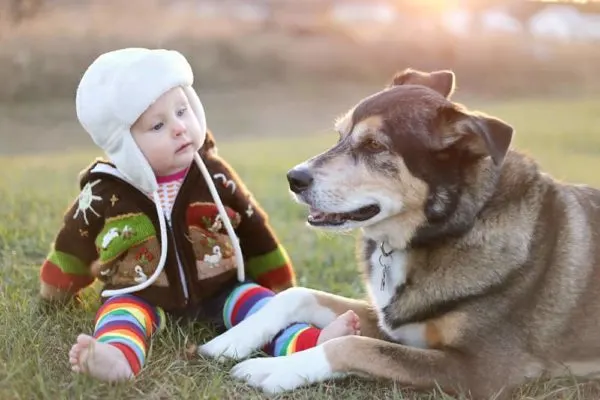
According to expert Michelle Miley, German Shepherds will usually treat children as they would their puppies. Parents need to supervise things as the baby becomes active.
A shepherd with proper socialization will likely tolerate grabbing and pulling, but they should never be left unattended with a baby regardless. Dogs should not be used as babysitters, regardless of their temperament.
Once your baby starts trying to walk, you’ll need to watch interactions with your dog a little more closely. The average German Shepherd’s size makes it easy for them to knock an unsteady youngster over.
What to Consider If You Get Your Dog After the Baby Comes
According to PuppyWire, German Shepherds enjoy popularity as a breed because of their reputation for being good with children. What if the dog arrives after the baby?
If you already have a baby but want to add a German Shepherd to your family, you have a couple of decisions to make. Puppy or adult? Breeder or rescue dog?
As tempting as it might be to get a german shepherd puppy, the responsibilities of caring for a baby while trying to raise and train a puppy might be challenging for some. If you have a spouse or other household member who can help out, this might be an option worthy of your consideration.
An adult dog who has grown out of its “wild” stage and received obedience training will be less likely to have troublesome behavioral issues. The individual dog’s personality will also be worth considering, as well as the socialization level.
Dogs from a breeder who uses sound, professional practices are more likely to have excellent temperaments. Avoid shady breeders who breed dogs of questionable health or personality, or refuse to take back a dog who doesn’t fit in with your family.
Rescue dogs are also a great option, especially if they have lived with a foster long enough to evaluate their safety around children. Bear in mind that you will need to train your dog and that some rescue dogs may have come from abusive homes.
Socialization matters just as much when the dog is the newcomer in the household. Regardless of the dog’s age, you’ll have to give him or her exposure to as many different people as possible to gain better social skills.
A dog with proper socialization is less likely to act out against a baby over healthy baby behaviors. Dogs used to the sounds that babies make are less likely to have these noises act as a trigger for their prey drive.
Videos like this one from Sad Cat show that a German Shepherd can get along well with a baby. Both supervision and socialization will make a difference.
Frequently Asked Questions
Do German shepherds get jealous of babies?
Yes, German Shepherds can get jealous of babies. However, just because they can, does not necessarily mean that they will. To an extent, this will be down to the individual dog. While some German shepherds are naturally quite jealous, others are not.
It is worth noting that German Shepherds are naturally quite a protective breed, and they can attempt to protect their owners and children.
They do quickly become attached to their owners, which can cause them to have jealous tendencies. Though, this is not always the case.
We would recommend training your dog to ensure that it does not become jealous. In addition to this, you will want your dog feeling comfortable in its own company and space to an extent. That way, they will not be demanding your attention when you have a baby.
Does a German shepherd make a good family pet?
Yes, German shepherds make great family pets. They are loving and particularly loyal. This is partly down to their herding background and mentality. They are a dog that does have guarding instincts, and that can be protective over younger children.
They have a lot of energy, and enjoy interactions, training, and playing games. Given that they love long walks, they can be a great option as a family pet. While many people are nervous of German Shepherds due to their size, they are mainly a soft and gentle breed.
As they are so intelligent, they are easy to train, which is important when purchasing a family dog. Training is essential in ensuring that your German shepherd is a suitable pet.
As they can be quite strong willed, if you are not training your dog enough, this can bring out its bad traits, such as aggression, stubbornness and potentially destructive behavior.
























